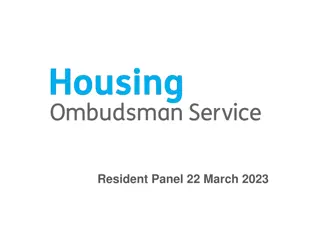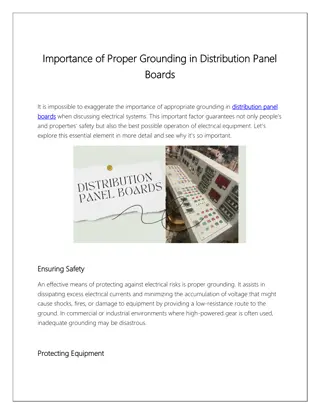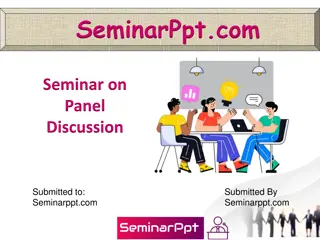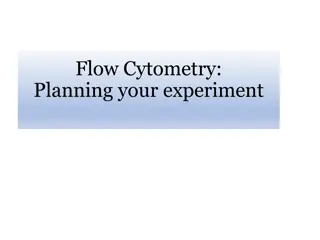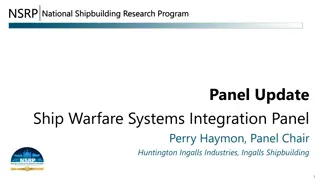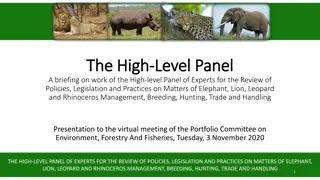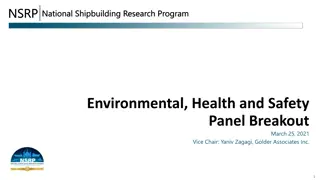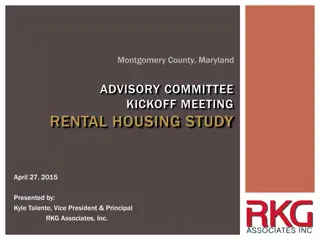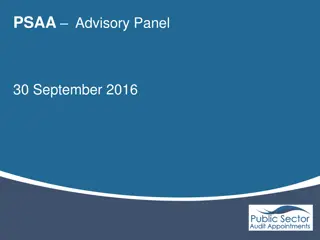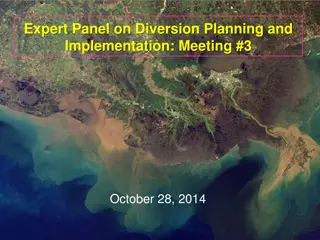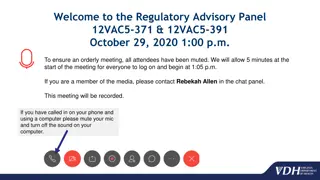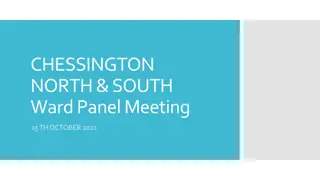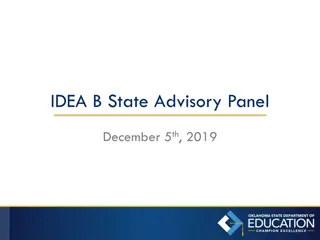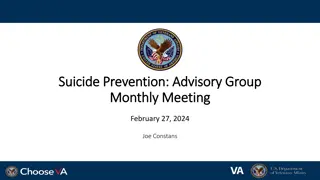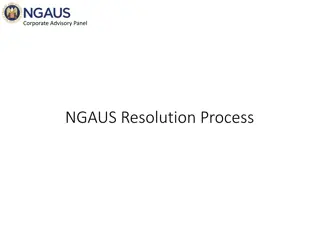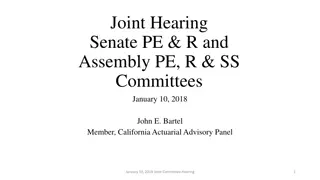Regulatory Advisory Panel Meeting - October 14, 2020
The Regulatory Advisory Panel meeting held on October 14, 2020, at 3:30 p.m. covered roll call details of attendees from various organizations and agencies. The meeting focused on key members and workgroup organizations pertaining to health care, hospice, and regulatory affairs. Attendees were urged to maintain order and adhere to meeting protocols. Media inquiries were directed to Rebekah Allen.
Download Presentation

Please find below an Image/Link to download the presentation.
The content on the website is provided AS IS for your information and personal use only. It may not be sold, licensed, or shared on other websites without obtaining consent from the author. Download presentation by click this link. If you encounter any issues during the download, it is possible that the publisher has removed the file from their server.
E N D
Presentation Transcript
Welcome to the Regulatory Advisory Panel 12VAC5-371 & 12VAC5-391 October 14, 2020 3:30 p.m. To ensure an orderly meeting, all attendees have been muted. We will allow 5 minutes at the start of the meeting for everyone to log on and begin at 3:35 p.m. If you are a member of the media, please contact Rebekah Allen in the chat panel. This meeting will be recorded. If you have called in on your phone and using a computer please mute your mic and turn off the sound on your computer.
Roll Call Name Organization or Agency David Abraham (designee Rebecca Moralez) Beth Sholom Village Melissa Andrews LeadingAge Virginia John Burns (designee Will Blackwell) Westminster Canterbury Richmond William Coleman (designee Colleen Lobb) The Virginia Home Ronald J. Cottrell Hospice of the Piedmont David DeBiasi AARP Carrie Davis Covenant Woods Joann Dawson Bedford Hospice House Morris Funk Beth Sholom Lifecare Community Carter Harrison Alzheimer's Association, Virginia Chapters Tracey Jennings Centra Richard Kennedy Blue Ridge Hospice House Tom Koutsoumpas (designee Michael Kestenbaum) Capital Caring Health
Roll Call Work Group Member Organization or Agency Joani Latimer State Long Term Care Ombudsman Vivienne McDaniel Aspen School of Nursing Kathryn J. Morrison Sentara Hospice House Dana Parsons LeadingAge Virginia April Payne Virginia Health Care Association | Virginia Center for Assisted Living Greg Storer Williamsburg Landing Marcia Tetterton Virginia Association for Home Care and Hospice Community Hospice House, Bon Secours Board of Long-Term Care Administrators, Department of Health Professions Virginia Lifecare Planning The Center for Elder Law & Estate Planning Carla Thompson Corie E. Tillman Wolf Veronica Williams Mindy Wyttenbach-Lindsey Virginia Association for Hospices and Palliative Care
Roll Call Name Organization or Agency Rebekah E. Allen Office of Licensure and Certification, Department of Health Kimberly F. Beazley Office of Licensure and Certification, Department of Health Kristin Collins Office of Epidemiology, Department of Health Joseph Hilbert Governmental and Regulatory Affairs, Department of Health Sarah File Lineberger Office of Epidemiology, Department of Health Ruth Morrison Richmond & Henrico Health Districts, Department of Health Sara Noble Richmond & Henrico Health Districts, Department of Health Brenden Rivenbark Governmental and Regulatory Affairs, Department of Health
Regulatory Advisory Panel - Agenda Public Comment Period Charge of the Regulatory Advisory Panel Update on Status of HB 5041/SB 5042 Visitation Guidance and Visitor Health and Safety Requirements from Other Jurisdictions Rebekah Allen, Senior Policy Analyst Office of Licensure and Certification Ms. Allen Discussion and Recommendations on Facility Access by Specific Categories of People Discussion and Recommendations on Health and Safety Requirements for Visitors Ms. Allen and Regulatory Advisory Panel Members Ms. Allen and Regulatory Advisory Panel Members Wrap Up and Next Steps Ms. Allen
Public Comment Period No written public comments were received Written comments should be sent to Rebekah.Allen@vdh.virginia.gov There is a two minute time limit for each person to speak. We will be calling from the list generated through registration. After the 2 minute public comment limit is reached we will let you complete the sentence and will mute you and move on to the next attendee. We will call the name of the person on list and also the name of the person is next on the list.
HB 5041 / SB 5042 Amends Va. Code 32.1-127(B) to read: 28. During a public health emergency related to COVID-19, shall require each nursing home and certified nursing facility to establish a protocol to allow each patient to receive visits, consistent with guidance from the Centers for Disease Control and Prevention and as directed by the Centers for Medicare and Medicaid Services and the Board. Such protocol shall include provisions describing
HB 5041 / SB 5042 (i) the conditions, including conditions related to the presence of COVID- 19 in the nursing home, certified nursing facility, and community, under which in-person visits will be allowed and under which in-person visits will not be allowed and visits will be required to be virtual; (ii) the requirements with which in-person visitors will be required to comply to protect the health and safety of the patients and staff of the nursing home or certified nursing facility; (iii) the types of technology, including interactive audio or video technology, and the staff support necessary to ensure visits are provided as required by this subdivision; and (iv) the steps the nursing home or certified nursing facility will take in the event of a technology failure, service interruption, or documented emergency that prevents visits from occurring as required by this subdivision
HB 5041 / SB 5042 Such protocol shall also include (a) a statement of the frequency with which visits, including virtual and in-person, where appropriate, will be allowed, which shall be at least once every 10 calendar days for each patient; (b) a provision authorizing a patient or the patient's personal representative to waive or limit visitation, provided that such waiver or limitation is included in the patient's health record; and (c) a requirement that each nursing home and certified nursing facility publish on its website or communicate to each patient or the patient's authorized representative, in writing or via electronic means, the nursing home's or certified nursing facility's plan for providing visits to patients as required by this subdivision
HB 5041 / SB 5042 Amends Va. Code 32.1-162.5 to read: C. Regulations for hospices shall require each hospice facility to establish a protocol to allow each patient to receive visits, consistent with guidance from the Centers for Disease Control and Prevention and as directed by the Centers for Medicare and Medicaid Services and the Board, during a public health emergency related to COVID-19. Such protocol shall include provisions describing
HB 5041 / SB 5042 (i) the conditions, including conditions related to the presence of COVID- 19 in the hospice facility and community, under which in-person visits will be allowed and under which in-person visits will not be allowed and visits will be required to be virtual; (ii) the requirements with which in-person visitors will be required to comply to protect the health and safety of patients and staff of the hospice facility; (iii) the types of technology, including interactive audio or video technology, and the staff support necessary to ensure visits are provided as required by this subsection; and (iv) the steps the hospice facility will take in the event of a technology failure, service interruption, or documented emergency that prevents visits from occurring as required by this subsection
HB 5041 / SB 5042 Such protocol shall also include (a) a statement of the frequency with which visits, including virtual and in-person, where appropriate, will be allowed, which shall be at least once every 10 calendar days for each patient; (b) a provision authorizing a patient or the patient's personal representative to waive or limit visitation, provided that such waiver or limitation is included in the patient's health record; and (c) a requirement that each hospice facility publish on its website or communicate to patients or their personal representatives, in writing or via electronic means, the hospice facility's plan for providing visits to patients as required by this subsection
Update on HB 5041 / SB 5042 Both enrolled bills were communicated to the Governor on October 14th Governor s action deadline is 11:59PM on October 21st If the Governor does nothing, these bills will become law If the Governor signs them, these bills will become law If the Governor vetoes them, they will be returned to the General Assembly The Governor may recommend amendments and return the bills to the General Assembly
VISITATION GUIDANCE AND VISITOR HEALTH AND SAFETY REQUIREMENTS FROM OTHER JURISDICTIONS
CMS Core Principles of COVID-19 Infection Prevention Screening of all who enter the facility for signs and symptoms of COVID-19 and denial of entry of those with signs or symptoms Hand hygiene Face covering or mask Social distancing at least six feet between persons Instructional signage throughout the facility and proper visitor education on COVID19 signs and symptoms, infection control precautions, other applicable facility practices Cleaning and disinfecting high frequency touched surfaces in the facility often, and designated visitation areas after each visit Appropriate staff use of Personal Protective Equipment (PPE) Effective cohorting of residents Resident and staff testing conducted as required
North Carolina Conduct pre-visit orientation to, and screenings of, visitors and ensure visitors bring and wear a mask for face covering Screen for fever > 100.0 F, cough, shortness of breath, sore throat, muscle aches, chills or new onset of loss of taste or smell prior to resident being transported to the designated space Visitors must attest to not having signs or symptoms or current diagnosis of COVID-19; if they have had COVID-19, they must provide documentation that they no longer meet CDC criteria for transmission-based precautions. Facility must inform visitors that if they develop signs and symptoms within 2 days of visiting a resident or have a diagnosis of COVID-19, the visitor must immediately notify the facility of the date they were visiting and the resident s name
North Carolina (cont.) Facilities must immediately screen the resident who had contact with the visitor and follow up with the facility s medical director or resident s care provider Visitors must bring and wear a proper face covering or mask covering both the mouth and nose for the entire visit or wear a facility-provided surgical mask covering both the mouth and nose, if available Visitors, residents and staff must use alcohol-based hand rub before and after visitation and limit surfaces touched Visitors must limit interactions with others and remain at least 6 feet from other residents and staff at all times Visitors who are unable to adhere to requirements above should not be permitted to visit or should be asked to leave
Maryland Visitors are screened for symptoms and not permitted to visit even outdoors -- if symptomatic. Visitors and residents wear a face covering at all times Hand Hygiene is performed before and after each visit Visitors and residents maintain proper social distancing at all times and physical contact is not allowed during visits Residents may be placed on observation if appropriate distancing is not maintained Items in the visitation area are cleaned and disinfected between visits A staff member is present to ensure resident safety and appropriate adherence to guidelines Visitors who do not comply with safety recommendations should be asked to leave. Only 2 visitors are allowed per resident per visit. Facilities should consider limiting and/or scheduling outdoor visitation time
West Virginia 100% screening of visitors Visitation by appointment only Visits take place in facility-designated location Facility may limit duration of visitation Visitors must wear face covering at a minimum, maintain 6-foot social distancing, and use proper hand hygiene Phase Yellow (No active COVID-19 positive residents in the past 14 days) No more than 2 visitors per resident at one time No visitors under 12 yeas of age Phase Green (No active COVID-19 positive residents in the past 28 days) Number and age of visitors determined by facility
Pennsylvania A Compassionate Caregiver is an individual identified by a care plan decision team to provide the resident with care that will improve their health. Compassionate Caregivers will need to meet these requirements: Proof of a negative COVID-19 test result no more than seven days before initiating caregiver duties; Following all ongoing testing requirements that apply to facility staff pursuant to all department guidance and Orders; and Being screened before entering the facility, adhering to universal masking, practicing hand sanitization and maintaining social distancing from staff and other residents. Compassionate Caregivers should not visit more than two hours per day, and there should not be more than two Caregivers per resident at a time
Delaware Distinguishes between support person and other visitors Screening must include a temperature read and baseline questions regarding current CDC-recognized symptoms the individual may be experiencing. Check-in must include signing a visitor's log (name, date, time, name of resident, resident room#, resident unit). Facilities encourage to have visitors to sign disclosure upon arrival stating they are aware of the risks and must notify the facility if they start experiencing symptoms, test positive for COVID-19, or have been asked to isolate within 14 days after the visit. Support persons must be tested for COVID-19. Visitor testing prior to visitation is strongly encouraged though at the facility s discretion
Delaware (cont.) Visitation by appointment only In-person visitation available only for COVID negative/recovered residents Maximum 2 visitors per resident per in-person visit Staff monitor to ensure safety compliance Facility-designated location Staff to disinfect visitation area before and after each visit Proper hand hygiene Minimum 6 feet social distancing No contact Masks at all times (face coverings for residents and visitors)
Delaware (cont.) Support person (SP) - an outside caregiver, who, prior to visitor restrictions, was regularly engaged with the resident at least once a week to provide companionship and/or assist with activities requiring one-on-one direction. A negative COVID-19 test is required before the SP may be scheduled for support, and the SP is subject to regular testing required of LTC vendors. Schedule and amount of time in facility must be agreed upon in advance. The LTC must allow evening and weekend visits that accommodate the SP who may be limited by work or childcare barriers. Designate a central point of entry where the SP signs in and is actively screened for symptoms of COVID-19 prior to entering the building, in the same manner as facility staff. The SP must wear all necessary PPE (minimally a face mask and gloves when providing direct care), and must perform frequent hand hygiene The facility should ensure hand sanitizing stations and alcohol-based hand rubs are accessible.
Delaware (cont.) The facility must educate the SP on how to don/doff necessary PPE appropriately The SP must inform the LTC provider if they develop a fever or symptoms consistent with COVID-19 within 14 days of a visit to the resident Direct the SP to provide care in the resident's room, or in facility- designated areas within the building. The SP must limit movement in the facility, though an SP may take the resident outside for a walk The SP must maintain social distancing of at least 6 feet with staff and other residents while in the building The SP may not visit a resident during a resident's 14-day quarantine, and may not visit when a resident is positive for COVID-19 or symptomatic, unless the visit is for compassionate care
Other essential caregiver or support person approaches MO: Individual who has been given consent by the resident, or their guardian or legal representative, to provide health care services or assistance with activities of daily living (ADLs) to help maintain or improve quality of care or quality of life of a facility residents. Care or services provided are included in plan of care or service plan Only one present at any given time Must complete facility infection prevention and control training Must be screened NH: Designated person who can provide consistent support to the resident in ADLs Considered compassionate care visitors; however, are only permitted in Phase II ) (50 cases per 100,000 or fewer and operated in Phase I for at least 14 days) and Phase III (10 cases per 100,000 or fewer and operated in Phase II for at least 14 days) IN: Not defined by permitted as a type of compassionate care
DISCUSSION AND RECOMMENDATIONS ON FACILITY ACCESS BY SPECIFIC CATEGORIES OF PEOPLE
Categories of Facility Entrants: Professionals State Health Commissioner or his designee (i.e. Medical Facilities Inspectors) Representative of the State Long-Term Care Ombudsman Representatives of protection and advocacy systems Assistants to effective communication if not otherwise available on site Representatives of Adult Protective Services and Child Protective Services Health care workers who are not employees of the facility, who provide direct care to residents or patients, and who are not emergency medical services (EMS) personnel
Categories of Facility Entrants: Personal Essential caregiver CMS does not distinguish essential caregivers from other visitors (see QSO-20-39-NH) Other states may define the term and treat these visitors as a type of compassionate care visitor? HB 5005 (2020 Special Session Budget Bill) contains an amendment that addresses a type of visitor is similar to the essential caregiver concept
HB 5005 Item 300 #1h In any case in which the Governor has declared a public health emergency related to the novel coronavirus (COVID-19), every medical care facility licensed by the Virginia Department of Health shall allow a person with a disability who requires assistance as a result of such disability to be accompanied by a designated support person at any time during which health care services are provided no medical care facility shall be required to allow more than one designated support person to be present with a person with a disability at any time. A designated support person shall not be subject to any restrictions on visitation adopted by a medical care facility. However, such designated support person may be required to comply with all reasonable requirements of the medical care facility adopted to protect the health and safety of patients and staff of the medical care facility..."
HB 5005 Item 300 #1h A designated support person" means a person who is knowledgeable about the needs of a person with a disability and who is designated, orally or in writing, by the individual with a disability, the individual's guardian or the individual's care provider, to provide support and assistance, including physical assistance, emotional support, assistance with communication or decision-making, or any other assistance necessary as a result of the person's disability, to the person with a disability at any time during which health care services are provided.
Questions to Consider CMS allows in-person access for the LTC Ombudsman cannot be limited without reasonable cause. Should Virginia have a non-exclusive list of what constitutes reasonable cause in the regulation? Should CMS s guidance re: LTC Ombudsman and P&A systems be used for APS and CPS? Should Virginia define essential caregiver as a specific type of visitor? If yes, should essential caregivers be treated as a type of compassionate care visitor?
DISCUSSION AND RECOMMENDATIONS ON HEALTH AND SAFETY REQUIREMENTS FOR VISITORS
Questions to Consider Should there be a limit on how many people a resident or patient can receive at one time? If yes, should it vary based on a specific metric (e.g., county positivity rate, etc.)? As a condition of visitation, should in-person visitors be required to provide detailed sign-in information and to agree to contact the facility upon receipt of a positive COVID-19 test within X number of days of their visit? Are there specific health and safety requirements that should be placed on compassionate care visitors?










